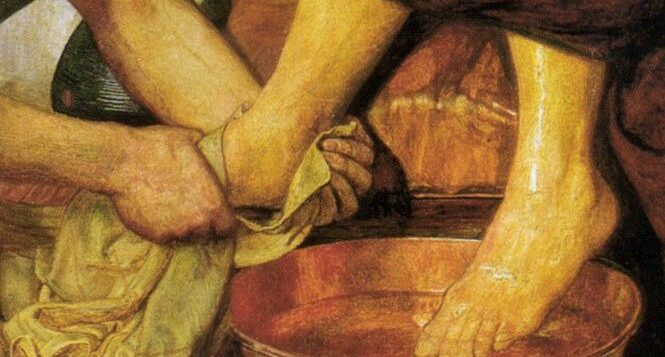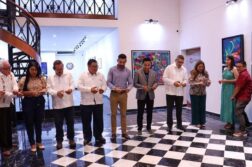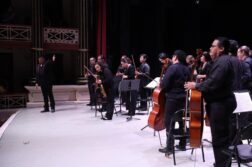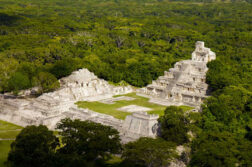(CNN)The week leading up to Easter is called Holy Week. It begins with Palm Sunday and ends on Holy Saturday, but each day in between comes with its own name and celebrations.Today is Maundy Thursday. In the Bible, this is the day when the Last Supper takes place, and it marks the moment that Jesus established the sacrament of the Eucharist, which is now part of every mass. The Last Supper also included a ceremony in which Jesus washed the feet of his disciples. It marks the foundation of the priesthood.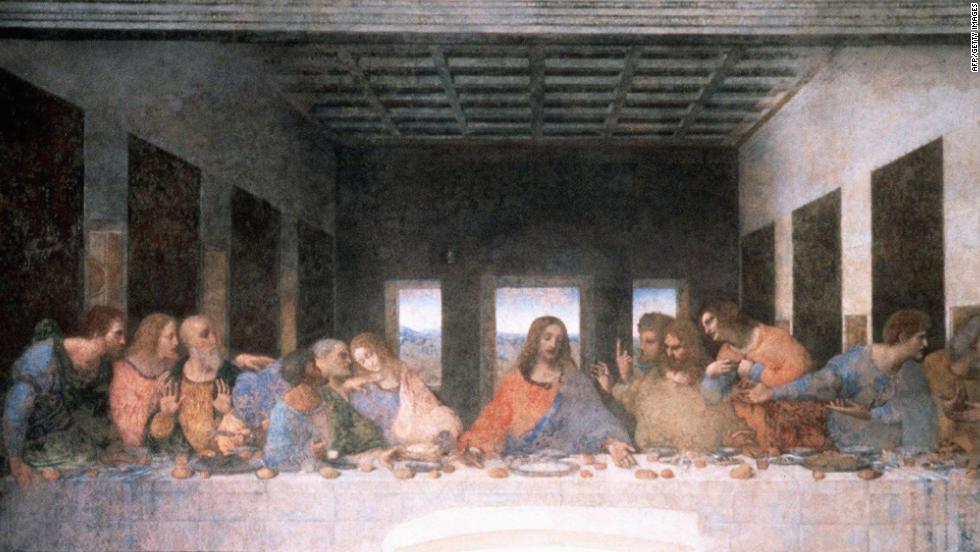 Leonardo da Vinci’s «Last Supper.»The day gets it name from the Latin word «mandatum,» meaning commandment.It is a reference to what Jesus tells his disciples during the Last Supper: «A new commandment I give you, that you love one another; even as I have loved you, that you also love one another.» (John 13:34, Revised Standard Version).Maundy Thursday is considered a somber time in the Christian faith for all denominations of the religion, including the Catholic and Protestant traditions. Following the Last Supper and the original Eucharist, Jesus would be betrayed by Judas. Despite the celebratory nature of Palm Sunday, which marks the start of Holy Week and is when Jesus triumphantly entered Jerusalem, Holy Thursday represents the steps leading to the crucifixion.In years past, Pope Francis continued the tradition of the Eucharist by washing prisoner’s feet on this day in order to demonstrate his willingness to serve the farthest margins of society.
Leonardo da Vinci’s «Last Supper.»The day gets it name from the Latin word «mandatum,» meaning commandment.It is a reference to what Jesus tells his disciples during the Last Supper: «A new commandment I give you, that you love one another; even as I have loved you, that you also love one another.» (John 13:34, Revised Standard Version).Maundy Thursday is considered a somber time in the Christian faith for all denominations of the religion, including the Catholic and Protestant traditions. Following the Last Supper and the original Eucharist, Jesus would be betrayed by Judas. Despite the celebratory nature of Palm Sunday, which marks the start of Holy Week and is when Jesus triumphantly entered Jerusalem, Holy Thursday represents the steps leading to the crucifixion.In years past, Pope Francis continued the tradition of the Eucharist by washing prisoner’s feet on this day in order to demonstrate his willingness to serve the farthest margins of society.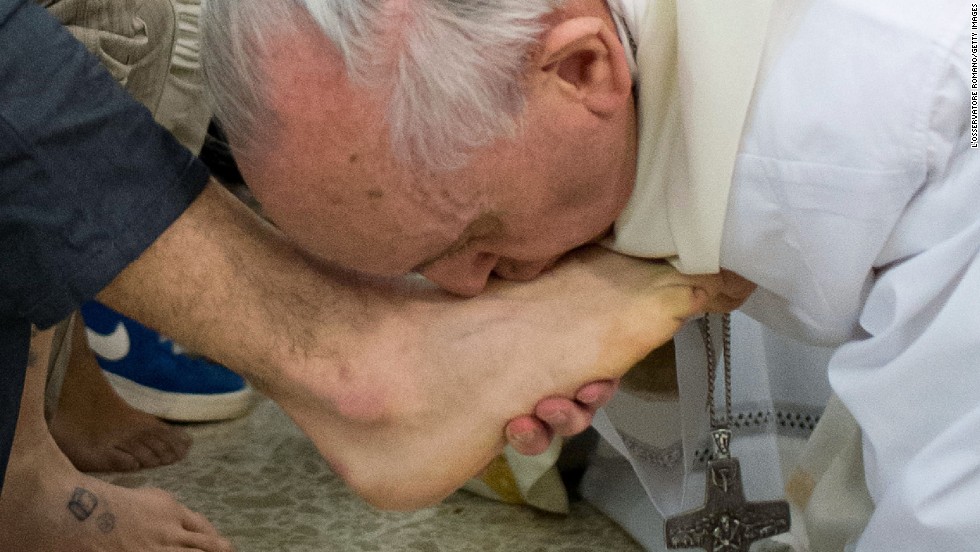 Pope Francis kisses the feet of a prisoner at the Casal Del Marmo Youth Detention Centre during the mass of the Lord’s Supper on March 28, 2013 in Rome, Italy.Maundy Thursday falls before Good Friday, a day when the church commemorates the crucifixion and death of Jesus at Golgotha, in Jerusalem, which is also known as the Place of the Skull.
Pope Francis kisses the feet of a prisoner at the Casal Del Marmo Youth Detention Centre during the mass of the Lord’s Supper on March 28, 2013 in Rome, Italy.Maundy Thursday falls before Good Friday, a day when the church commemorates the crucifixion and death of Jesus at Golgotha, in Jerusalem, which is also known as the Place of the Skull.
This piece was first published in 2019
By Jodi Upchurch, CNN
Here’s how to celebrate Holy Thursday at home
Here you have the prayers, readings, and everything else you need to celebrate with God’s Word.
Aleteia, with the help of Magnificat magazine, proposes that you sanctify this Holy Thursday with a celebration of the Word of God, commemorating the Lord’s Supper.
Instructions:
- We should keep in mind what Saint Jerome said about listening to the Word of God: “When we refer to the Eucharistic Mystery and a crumb of bread falls, we feel lost. When we listen to the Word of God, it is the Word of God and the Body and Blood of Christ that fall on our ears. Would we think of anything else?”
- This celebration should preferably take place in the late afternoon or evening.
- This celebration requires the presence of at least two people.
- If you’re alone, it is better to simply read the readings and prayers of the Mass of the day in your missal.
- This celebration is particularly suitable for use with family. In order to respect quarantine measures, you should refrain from inviting others from outside your household. If anyone in your house is ill, make sure they remain in isolation to ensure that all safety guidelines are strictly followed.
- Set up the needed number of chairs in front of a prayer corner, respecting distance between them.
- A simple cross or crucifix must always be visible in the background.
- Light one or more candles, placing them on non-flammable stands (such as candlesticks or small porcelain plates). Don’t forget to blow them out at the end of the celebration. Flowers should not be used; this sign of joy will be reserved for the Easter season.
- Designate a person to lead the prayer. He or she will also determine the length of the periods of silence. Designate a reader.
HOLY THURSDAY
With our eyes fixed on Jesus Christ,
let us enter into God’s combat.
All are seated.
The leader of the celebration reads:
Brothers and sisters,
on this Holy Thursday,
let us keep our eyes fixed on Jesus Christ,
at the moment when he taught his disciples
to perpetuate, until the end of time,
the Eucharist of his life
for the remission of our sins.
As well, whenever this offering
is celebrated in his memory,
it is the work of our redemption that is being accomplished.
Sadly, on this day,
we are prevented from assembling
to participate in the meal
which is the sacrament of his love.
Nevertheless, we know that when
we gather to pray in his name,
Christ is very present among us,
and we believe that when we read his Word in the Church,
it is the Word of God himself speaking to us.
Pause
O Jesus, we are deprived
of Communion with your body given up for us,
and your blood spilled for us.
We beg you:
according to the promises of your Church
let your Word be for us
real food for our lives;
and give us the strength to imitate you,
making your offering present through our lives,
by loving each other
the way you loved us.
After three minutes of silence, all rise and make the Sign of the Cross, saying:
In the name of the Father, and of the Son, and of the Holy Spirit. Amen.
The leader continues:
To prepare ourselves to receive God’s Word
and in order for it to heal us,
we recognize ourselves as sinners.
The penitential rite follows. For example:
Have mercy on us, O Lord.
For we have sinned against you.
Show us, O Lord, your mercy.
And grant us your salvation.
May Almighty God have mercy on us;
forgive us our sins,
And bring us to everlasting life.
Amen.
The following is said or sung:
Lord, have mercy.
Lord, have mercy.
Christ, have mercy.
Christ, have mercy.
Lord, have mercy.
Lord, have mercy.
PRAYER
The leader says the opening prayer:
Almighty every-living God,
grant us so to celebrate
the mysteries of the Lord’s Passion
that we may merit to receive your pardon.
Through our Lord Jesus Christ, your Son,
who lives and reigns with you in the unity
of the Holy Spirit,
one God, for ever and ever.
Amen.
The readings are taken from the Mass for Holy Thursday.
The reader of the first reading remains standing while the rest sit down.
FIRST READING
A reading from the book of Exodus (Ex 12:1-8, 11-14)
The LORD said to Moses and Aaron in the land of Egypt,
“This month shall stand at the head of your calendar;
you shall reckon it the first month of the year.
Tell the whole community of Israel:
On the tenth of this month every one of your families
must procure for itself a lamb, one apiece for each household.
If a family is too small for a whole lamb,
it shall join the nearest household in procuring one
and shall share in the lamb
in proportion to the number of persons who partake of it.
The lamb must be a year-old male and without blemish.
You may take it from either the sheep or the goats.
You shall keep it until the fourteenth day of this month,
and then, with the whole assembly of Israel present,
it shall be slaughtered during the evening twilight.
They shall take some of its blood
and apply it to the two doorposts and the lintel
of every house in which they partake of the lamb.
That same night they shall eat its roasted flesh
with unleavened bread and bitter herbs.
“This is how you are to eat it:
with your loins girt, sandals on your feet and your staff in hand,
you shall eat like those who are in flight.
It is the Passover of the LORD.
For on this same night I will go through Egypt,
striking down every firstborn of the land, both man and beast,
and executing judgment on all the gods of Egypt—I, the LORD!
But the blood will mark the houses where you are.
Seeing the blood, I will pass over you;
thus, when I strike the land of Egypt,
no destructive blow will come upon you.
“This day shall be a memorial feast for you,
which all your generations shall celebrate
with pilgrimage to the LORD, as a perpetual institution.”
The Word of the Lord.
Thanks be to God.
The reader of the psalm stands, while the others remain seated.
It is preferable for the psalm to be sung. If the celebration is in a family context, the refrain may be simply said or sung by all after the reader has read each strophe.
PSALM (69:8-10, 21-22, 31 and 33-34)
R/ Our blessing-cup is a communion with the Blood of Christ.
How shall I make a return to the LORD
for all the good he has done for me?
The cup of salvation I will take up,
and I will call upon the name of the LORD.
R/ Our blessing-cup is a communion with the Blood of Christ.
Precious in the eyes of the LORD
is the death of his faithful ones.
I am your servant, the son of your handmaid;
you have loosed my bonds.
R/ Our blessing-cup is a communion with the Blood of Christ.
To you will I offer sacrifice of thanksgiving,
and I will call upon the name of the LORD.
My vows to the LORD I will pay
in the presence of all his people.
R/ Our blessing-cup is a communion with the Blood of Christ.
SECOND READING
A reading from the first letter of Paul to the Corinthians (1 Cor 11:23-26)
Brothers and sisters:
I received from the Lord what I also handed on to you,
that the Lord Jesus, on the night he was handed over,
took bread, and, after he had given thanks,
broke it and said, “This is my body that is for you.
Do this in remembrance of me.”
In the same way also the cup, after supper, saying,
“This cup is the new covenant in my blood.
Do this, as often as you drink it, in remembrance of me.”
For as often as you eat this bread and drink the cup,
you proclaim the death of the Lord until he comes.
The Word of the Lord.
Thanks be to God.
GOSPEL
All rise and say or sing the acclamation of the gospel.
Praise to you, Lord Jesus Christ,
King of endless glory!
I give you a new commandment, says the Lord:
love one another as I have loved you.
Praise to you, Lord Jesus Christ,
King of endless glory!
The Gospel is not proclaimed, but merely read with simplicity.
The reader introduces the text by solemnly saying:
A reading from the Holy Gospel according to John (Jn 13, 1-15)
Before the feast of Passover, Jesus knew that his hour had come
to pass from this world to the Father.
He loved his own in the world and he loved them to the end.
The devil had already induced Judas, son of Simon the Iscariot, to hand him over.
So, during supper,
fully aware that the Father had put everything into his power
and that he had come from God and was returning to God,
he rose from supper and took off his outer garments.
He took a towel and tied it around his waist.
Then he poured water into a basin
and began to wash the disciples’ feet
and dry them with the towel around his waist.
He came to Simon Peter, who said to him,
“Master, are you going to wash my feet?”
Jesus answered and said to him,
“What I am doing, you do not understand now,
but you will understand later.”
Peter said to him, “You will never wash my feet.”
Jesus answered him,
“Unless I wash you, you will have no inheritance with me.”
Simon Peter said to him,
“Master, then not only my feet, but my hands and head as well.”
Jesus said to him,
“Whoever has bathed has no need except to have his feet washed,
for he is clean all over;
so you are clean, but not all.”
For he knew who would betray him;
for this reason, he said, “Not all of you are clean.”
So when he had washed their feet
and put his garments back on and reclined at table again,
he said to them, “Do you realize what I have done for you?
You call me ‘teacher’ and ‘master,’ and rightly so, for indeed I am.
If I, therefore, the master and teacher, have washed your feet,
you ought to wash one another’s feet.
I have given you a model to follow,
so that as I have done for you, you should also do.”
No acclamation concludes the reading of the Gospel.
All are seated.
The leader repeats slowly, as if it were a far-off echo:
In the depths of our heart, let us allow
these words to echo, as a program of life:
“I have given you a model to follow,
so that as I have done for you,
you should also do.”
All observe three minutes of silence for silent personal meditation.
The leader indicates the end of the period of silence, and invites all to rise.
The leader introduces the Lord’s Prayer:
United in the Spirit and in the communion of the Church,
we dare to pray as the Lord Jesus himself
taught us:
All say or sing the Our Father:
Our Father…
Continuing immediately with:
For the kingdom…
Then the leader invites those present to share a sign of peace:
We have just joined our voices
with that of the Lord Jesus to pray to the Father.
We are sons and daughters in the Son.
In the love that unites us with one another,
renewed by the word of God,
we can exchange a gesture of peace,
a sign of the communion
we receive from the Lord.
All then exchange a greeting of peace from a distance: for example, by bowing deeply towards each other in turn; or, as a family, by blowing each other a kiss. Then all sit down.
SPIRITUAL COMMUNION
The leader says:
When we cannot receive sacramental communion for lack of a Mass, Pope Francis urges us to practice spiritual communion, also called “communion of desire.”
The Council of Trent reminds us that this “consists in an ardent desire to feed on the Heavenly Bread, with a living faith that acts through charity and that makes us participants in the fruits and graces of the Sacrament.” The value of our spiritual communion depends therefore on our faith in the presence of Christ in the Eucharist as a source of life, love and unity, and our desire to receive Communion in spite of our inability to do so.
In order increase our desire for Christ’s presence, let us sing together the chant Ubi caritas est vera, Deus ibi est: Where there is true charity, God is present.
HYMN
All together sing the refrain in Latin.
The reader reads the verses slowly and contemplatively.
R/ Ubi caritas est vera, Deus ibi est.
Where there is true charity, God is present.
It is not we who have loved God,
But He who has loved us first,
And who sent his Son as expiation for our sins.
R/ Ubi caritas est vera, Deus ibi est.
Where there is true charity, God is present.
If God so loved us,
We also must love one other,
No one has ever seen God.
Yet, if we love one other,
God remains in us.
R/ Ubi caritas est vera, Deus ibi est.
Where there is true charity, God is present.
In this way the love of God was revealed to us:
God sent his only Son into the world,
so that we might have life through him.
He gave us his Spirit.
R/ Ubi caritas est vera, Deus ibi est.
Where there is true charity, God is present.
Whoever does not love a brother whom he has seen,
Cannot love God whom he has not seen.
This is the commandment we have received from Him:
Loving each other, as he loved us.
R/ Ubi caritas est vera, Deus ibi est.
At the end of the hymn, the leader of the celebration says:
I now invite you to bow your head,
close your eyes and recollect yourselves.
Pause
Deep in our hearts,
may a burning desire arise within us to unite ourselves with Jesus,
in sacramental communion,
and then to bring His love to life into our lives,
loving others as He loved us.
All remain in silence for 5 minutes for a heart-to-heart conversation with Jesus Christ.
FINAL BLESSING
The leader of the celebration, with hands joined in prayer,
says the blessing in the name of all:
Through the intercession of St. N. [patron saint of the parish, diocese or country],and of all the saints of God,
May the God of perseverance and courage
grant us to manifest throughout our lives
the spirit of sacrifice, compassion and love
of Christ Jesus.
Thus, in the communion of the Holy Spirit,
we will give glory to God,
the Father of our Lord Jesus Christ,
for ever and ever!
Amen.
All together facing the cross, each with their hands joined in prayer, invoke the Lord’s Blessing:
May the Lord let his face shine upon us
and come and save us. Amen.
All make the Sign of the Cross.
Then parents may trace the Sign of the Cross on their children’s foreheads.
CLOSING HYMN
To conclude the celebration, a familiar Eucharistic hymn may be sung.
*
* *
For tomorrow, Good Friday, Aleteia proposes a Celebration of the Passion, with a veneration of the cross, to help you continue to celebrate, despite the obstacles, the highlights of our Christian life, for the glory of God and the salvation of the world.
You can also find other resources for free on the Magnificat website.


